UHS Students Explore Computer Science, Coding, During I-STEM Camp’s CS Day
October 10, 2017
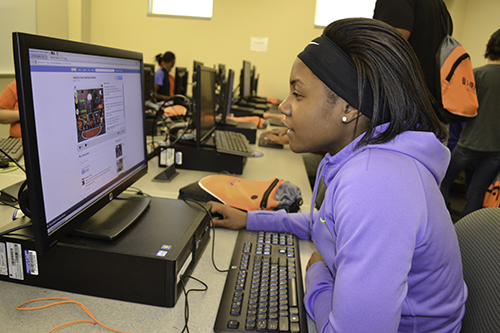
An I-STEM camper working on her Scratch project
For students from a generation that cut their teeth on computer and electronic games, what could be more fun that creating their own? So on Wednesday, August 16, 27 Urbana High School (UHS) students learned a bit about Computer Science and coding during CS Day at I-STEM’s multidisciplinary summer camp. And to put what they’d learned into practice, they each created their own game or story on Scratch.
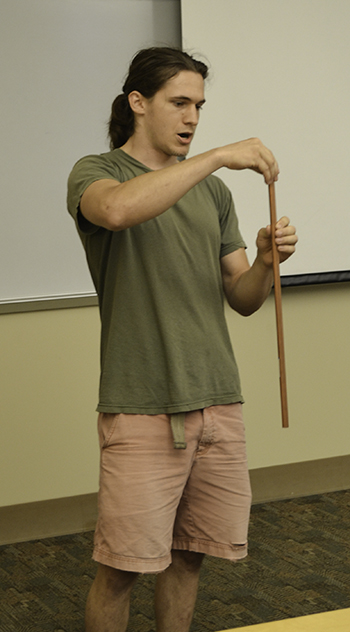
Above: CS PhD student Everett Hildenbrandt shares a magnet/copper activity with the campers.
Below: I-STEM camp mentor and ECE major Kushal Goenka talks to the campers about CS and coding
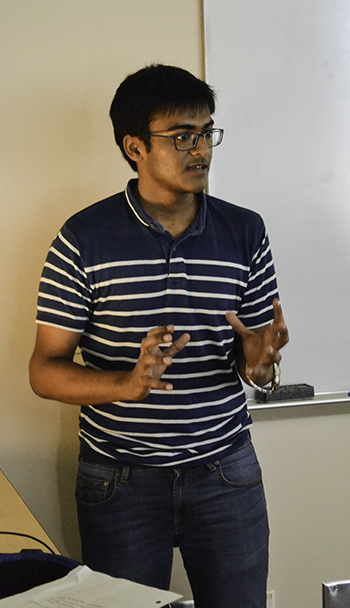
Computer Science is a field that can seem intimidating to many people, but I-STEM camp’s CS Day helped to demystify the discipline. I-STEM camp mentor and ECE major Kushal Goenka, played a key role in teaching the students about the many facets of CS, as well as helping them trouble shoot while doing some coding themselves. He began by teaching students how to code and exposing them to a variety of coding languages. Among the programs he introduced was one known as Scratch, a free online community where students can code and create their own games and stories or add on to those that other Scratch members have created.
After Goenka’s presentation about what it means to code, students visited a CS computer lab and made SCRATCH projects of their own. After an introductory session about Scratch, students logged onto computers in a CS computer lab to create their own projects. The students were quite engaged as they created their own programs and then got to present them to the other campers.
Following the Scratch project, students learned about real-world applications from CS PhD student Everett Hildenbrandt, who taught them that computer science is everywhere, explained about CS formal methods, then led them in a Magnet/Copper hands-on activity.
Everett shared with the students that it was this activity, which is somewhat related to physics that brought him into STEM, and from there he explored further during a physics internship, then a programming project.
At the end of the day, students were encouraged to reflect on all that they’d learned so far during the camp and to begin to tie every day of the camp together. Students were asked to think about the camp collectively and choose one word to describe their interaction with the STEM field. This word then became the basis of the group project they began working on in the afternoon. Their assignment was to put together a presentation and poster to be presented at Urbana High School to teach others what they had learned over the two-week camp. As students reflected on their experiences, they could hardly wait to come together to work on their project.
ECE sophomore and I-STEM mentor Kushal Geonka, who played a large role in the CS Day activities, shares why an outreach like I-STEM’s camp is beneficial for high school students.
“I feel like they don't have opportunities to actually see what college life could be, since they aren't exposed to them,” he says. “This gives them a hands-on opportunity to see how classes can be, colleges can be, and speak to professors. Yesterday, we had students interacting and eating lunch with a PhD professor who has been teaching here for 10 years, so he tells them how classes are going to be and how you have lectures, and work on your own. It prepares them for what lies in the future and not what they've been doing for 10-12 years in school.”
Goenka indicates that he participated in the camp because he was going to be here on campus for the two weeks following the end of his summer courses and was looking for something interesting to do.
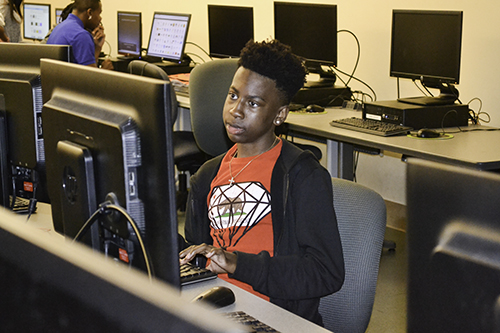
A UHS student works on his Scratch project
“I love STEM,” he admits. “It's what my interest lies in, so that's why I wanted to do this. I love talking with high school students. I think education is important, and encouraging them to get interested, and telling them about what STEM fields look like and the opportunities that lie further on.”
Goenka also had an ulterior motive: he wanted to be involved with the camp in order to experience some of the activities himself. “I wanted to experience all of this as well…After I found out more about it and knew that we'd be going to different departments around campus, I was intrigued, and I wanted to do that myself. I'm really interested in NCSA; I've never been there; we get to go to the Blue Waters [Supercomputer]."
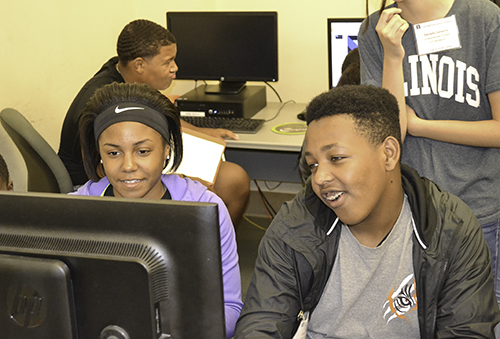
An I-STEM camper shows off her Scratch program to a couple of onlookers
What kind of impact did the camp appear to be having on the students? According to Goenka, it was very positive. “I think they are doing fantastic. Some of them are pleasantly engaged. They are asking questions and taking notes. I hope they go back and do research on this with all their binders and the notes that they've gotten from the professors and graduate students. I think it's good; I think they're learning a lot and I hope they will learn in the next week as well. They seem interested. Their faces light up when they interact with the students and they see feedback, so that's very good.”
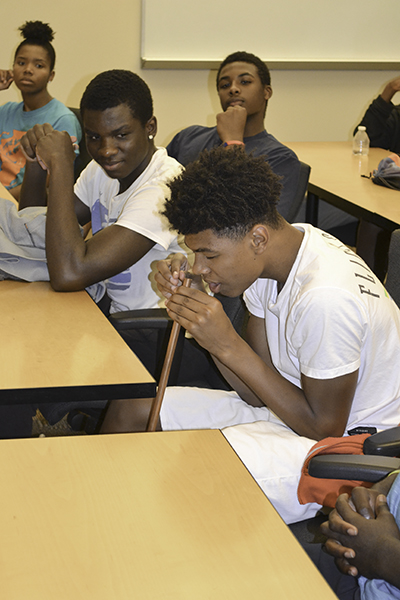
UHS students work on a Magnet/Copper hands-on activity
Author/Photographer: Elizabeth Innes, Communications Specialist, I-STEM Education Initiative, with help from Emily Loveland, Graduate Research Assistant, I-STEM Education Initiative
More: 8-12 Outreach, Computer Science, I-STEM Initiatives, STEM Pipeline, Summer Camp, Underserved Students/Minorities in STEM, Urbana High School, 2017
For additional articles about I-STEM's 2017 Summer Camp, see:
- I-STEM Multidisciplinary Summer Program Exposes UHS Athletes to Different STEM Departments/Units
- MCBees Use “Whodunit?” to Pique UHS Students’ Interest in Science During I-STEM Summer Camp
- MNTL Day Exposes UHS Students to Nanotechnology Research During I-STEM’s Summer Multidisciplinary Camp
- Akono and Company Teach UHS Students About Civil Engineering and Strength of Materials During I-STEM’s Multidisciplinary Summer Camp
- ECE Day at I-STEM’s Multidisciplinary Summer Camp: Soldering, Circuits, and Software
- Math Day at I-STEM’s Multidisciplinary Summer Camp Adds Up to Fun
- During I-STEM Summer Camp, Urbana High School Students’ Understanding of Aerospace Engineering Soars
- At I-STEM's Multidisciplinary Summer Camp, UHS Students Have Fun with Chemistry—Everything From Soap Making To Glow Sticks to Ice Cream
- UHS Students Gear Up for Mechanical Science and Engineering During I-STEM Summer Camp
- During I-STEM Camp’s NCSA Day, UHS Students Experience Data Visualization, Super Computers, and NCSA’s Research
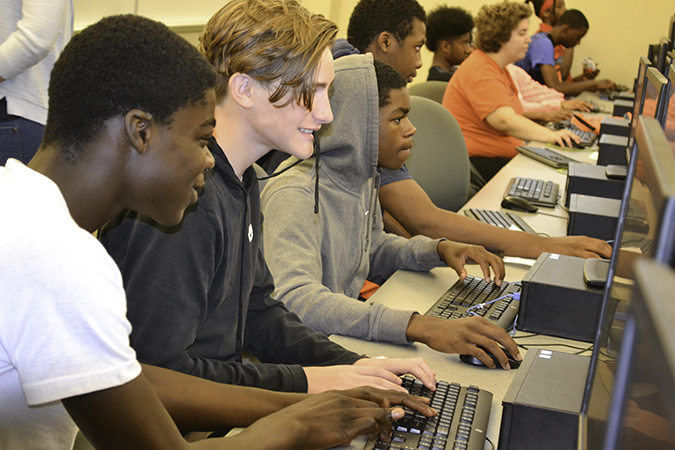
I-STEM campers engaged in coding their own Scratch programs













.jpg)
















